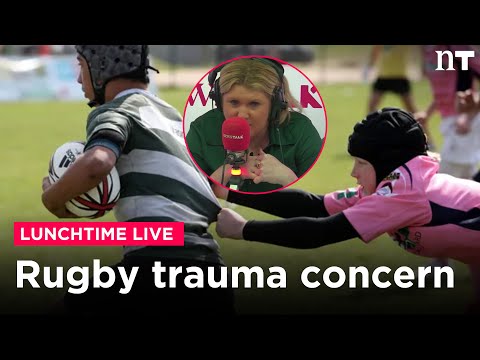Branding rugby as child abuse has led to a heated debate between callers on Lunchtime Live.
Researchers from University of Winchester in the UK have advised that permitting children to take part in impact sports, such as rugby and boxing, should be considered a form of abuse to the child's brain.
A new study examined the strength of medical evidence showing impact sports cause serious brain injuries and concluded that this harm "runs counter to existing laws around child abuse."
University of Winchester Professor of Sport Eric Anderson, who led the study, told the show there is more and more proof.
"It's entirely fair because it's entirely abusive to a child's brain," he said.
"I know it's a highly-emotive topic, people love rugby etc, but people also love tag rugby.
"Tag rugby doesn't intentionally structure trauma into a child's brain.
"We have decades of research on this now, and every new research project that comes out is worse and worse.
"The [US] National Institutes of Health and the Centres for Disease Control have both stated, definitively, that there's a cause and effect relationship between the micro-trauma that occurs as a regular occurance in children's tackle rugby, boxing or other high-impact sports and long-term brain trauma.
"This is not contestable, medically speaking.
"The problem is we have people who love these sports and don't want to believe the research, don't trust the research or don't know anything about the research".
Prof Anderson said management of contact is beside the point.
"The purpose of the sport is to collide, to bring another child down," he said.
"That has trauma to the brain as a part of it.
"I understand that the culture loves rugby, but a child's brain doesn't care about the culture.
"A child's brain is traumatised when it's hit - full stop.
"You're also very well aware of the fact that many professional rugby players, hundreds now, are suing World Rugby, the Rugby Football Union and other rugby bodies because of the long-term brain trauma.
"So, we can no longer stick our necks in the sand and not see the problem".
Prof Anderson said dementia is now being diagnosed in 18-year-olds, which is only found in high-impact collision sport athletes.
Boxing coach Liam Morley Brereton said there is more care given than ever before.
"I don't know why he says he's a professor in sport, he's scaremongering every parent," he said.
"In boxing you have medicals before, in no other sport does your kid need a medical before they take part even in the gym session, never mind the boxing.
"In kids boxing every one of them are medicled every year; they'd be medically [checked] three months before a competition and they're medically checked the day of the competition.
"If they win that fight, they're medically checked the next morning.
"If a punch is landed anywhere hard... you're checked after the fight.
"I used to ride horses as a kid and I got more falls; are we just going to stop playing every sport?"
1
vid:204162





